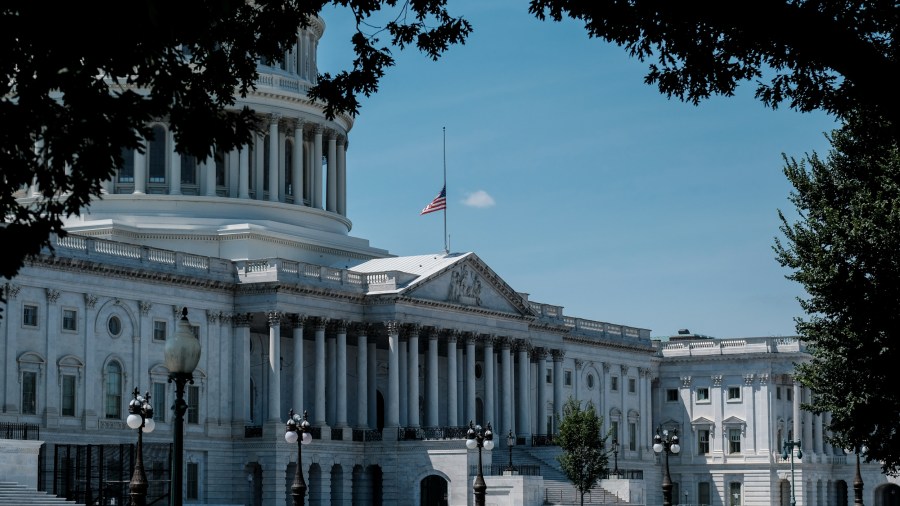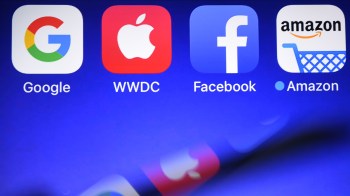What do Amazon, Apple, Facebook and Google have in common? One big congressional hearing.

Even in the context of all the things that are happening in the country right now, Monday is going to be a pretty big day. The CEOs of Amazon, Apple, Facebook and Google will testify before the House Judiciary Committee as part of Congress’ antitrust investigation.
It’s the first time all four have appeared together and the first time Jeff Bezos has shown up. All four companies are variously accused of using their size and dominance to kill competition. But like congressional hearings that have come before, it’s probably going to be a mess. I spoke with Cecilia Kang, who covers tech policy for the New York Times. The following is an edited transcript of our conversation.

Cecilia Kang: This is pretty historic to have the four CEOs of the biggest tech companies together testifying before Congress. [The companies] are viewed as too powerful and too big, and potentially harming consumers and competition because of their size and their dominance in their marketplaces. All of these companies are going to come with a defense that the market’s so fast moving and changing, if you lawmakers and enforcers in Washington, D.C., try to either break us up or punish us for what you believe to be an alleged monopoly, it may have more harmful effects than you imagined because the market is so fast moving.
Molly Wood: It’s so interesting, because the actual antitrust arguments with respect to the monopolistic behaviors, the consumer harm, isn’t always super clear. It sounds like what you’re saying is that some of it really is “You guys are too big. We’re worried about it. We’re trying to figure out where existing regulation might apply or new regulation could potentially be created.”
Kang: I think that’s exactly right. I think that that is the strongest defense that they have. These are companies that are creating new definitions for business, and they are converging in so many different spaces that it’s hard to neatly define what the markets are in the first place and what the abuses are. And all of them are going to say, “Consumers love us,” and consumer harm is hard to square when it comes to these companies. It’ll be interesting to see if any of them really get pinned on a particular antitrust issue in a deep and meaningful way.
Wood: And then meanwhile, you have Europe acting, but it seems like we keep having these hearings, Federal Trade Commission investigations keep dragging on [and] Europe is passing law after law.
Kang: You’re absolutely right. This is like a real Gilded Age moment, and we’re seeing the trusts, if you will, appear together, and that is historic. But there is in this country a big concern about being heavy handed toward this, particularly this segment of the economy. I think that in this economy today, during the pandemic, it’s going to be potentially unpopular for some of these companies to get really pinned down on antitrust violations in a way that harms them and stops them. I think that Amazon will probably say, “Look, we’ve created not just tens of thousands of jobs, but more than 100,000 jobs in X number of years. We’re a jobs creator.” Apple will say the same thing. And that, before the U.S. Congress, that’s compelling, and Republicans are really concerned about appearing too or even at all anti-market. What you will see Republicans do is to use this as an opportunity to talk about things like censorship and shadow banning and some of these issues that the administration, the Trump administration, has really tried to highlight. And if it becomes really politicized like that, then it will take away from the antitrust discussion, and perhaps the companies are OK with that.
Wood: What do you think would need to happen for these companies to actually change how they operate? Is it the lawsuits at the state level? Is it potentially the outcome of an FTC investigation? Because it doesn’t really seem like it’s Congress.
Kang: The Department of Justice is currently investigating Google and Apple and Facebook. They’re looking at these really complicated markets that Google and Facebook have really come to dominate, so we can expect action in the enforcement bureaus and on the federal level, as well as in the states, but it’s going to be not even just months of fighting, it could be years.
Related links: More insight from Molly Wood
House Republicans have called for Twitter CEO Jack Dorsey to testify as well, calling Twitter a “market leader,” even though it’s not under antitrust investigation. Those same House members want the hearing to include the full Judiciary Committee, not just the Antitrust Subcommittee, and as it happens, also believe firmly that Twitter has an anti-conservative bias and want to yell at Dorsey about it.
On that note, for a long time now, New York Times columnist Kevin Roose has been tweeting a list every day of the most popular stories on Facebook as measured by an analytics tool that Facebook owns. And almost every day, the most popular stories are from right-leaning and even far-right sources. On any given day, it’s a mix of Fox News, Ben Shapiro, Blue Lives Matter and Breitbart. So that is obviously not an anti-conservative bias. Casey Newton at The Verge reports this week that this recurring list has annoyed Facebook, and apparently its advertisers, so much that the head of the News Feed responded to say that the popularity list is based on how many people interact with a post. Facebook’s preferred measurement is reach, the sheer number of people who see a story. And by that measurement, most people’s News Feeds are much more mainstream, even though people are apparently way more engaged with right-wing information. Which is some data dancing on some level, to be sure. But Newton’s point is great: Why not just be even more transparent about what people are seeing and why? And maybe you won’t have to visit Congress so often.
Finally, speaking of Monday again, one company that’s not being represented at the hearing is Microsoft, which is a turnabout from the past when that company was the target of a giant decadelong antitrust investigation in the ’90s. But the company isn’t off the hook completely. Just this week, Slack filed a complaint against Microsoft in the European Union, saying Microsoft is trying to eliminate competition by bundling its Teams products, which is the Slack competitor to Microsoft’s Office suite.
The future of this podcast starts with you.
Every day, the “Marketplace Tech” team demystifies the digital economy with stories that explore more than just Big Tech. We’re committed to covering topics that matter to you and the world around us, diving deep into how technology intersects with climate change, inequity, and disinformation.
As part of a nonprofit newsroom, we’re counting on listeners like you to keep this public service paywall-free and available to all.
Support “Marketplace Tech” in any amount today and become a partner in our mission.


















